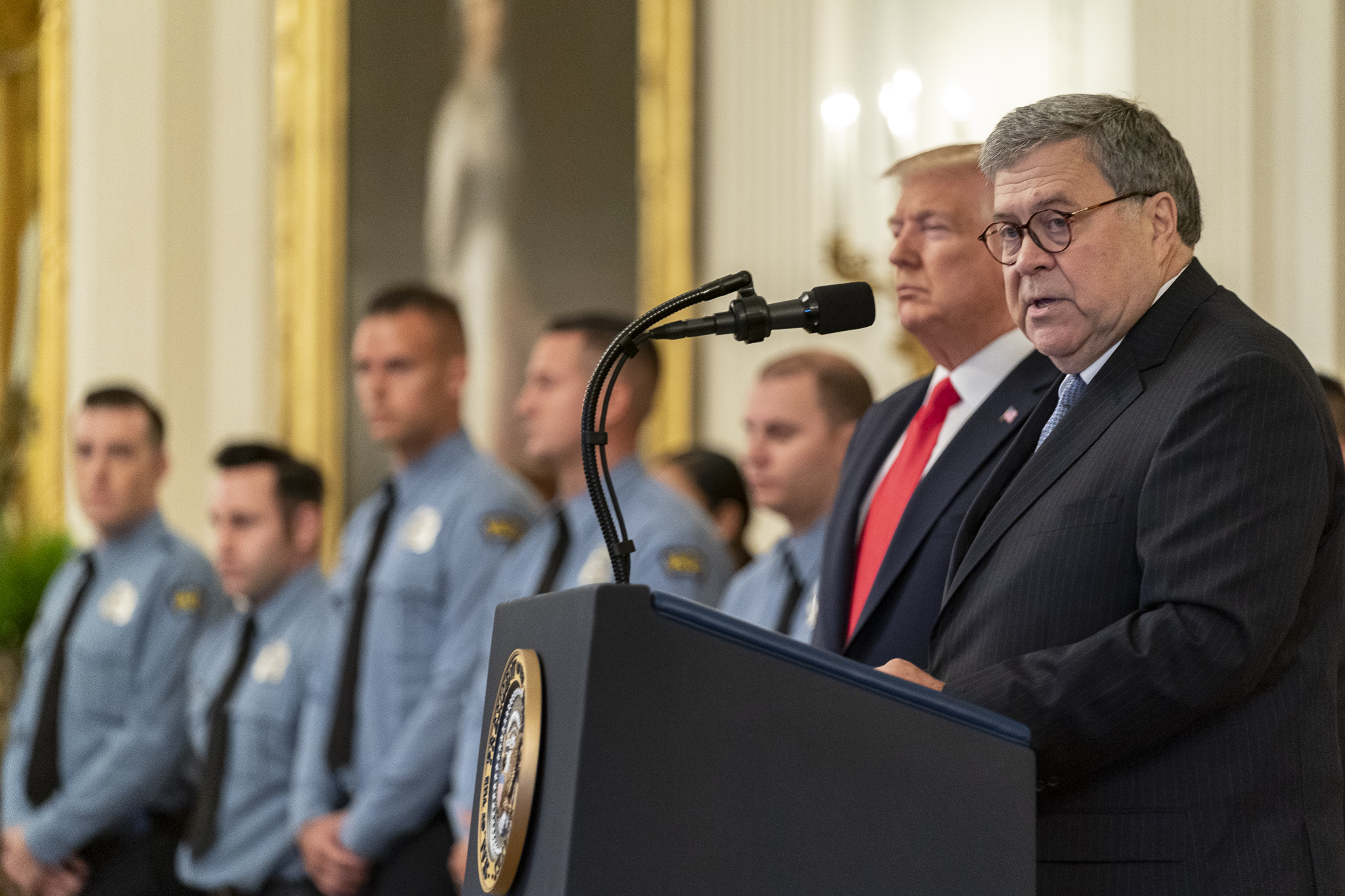Today's Headlines and Commentary
Vice President Joe Biden will not be running for president. Biden announced his decision this afternoon at the White House, ending months of speculation among over a possible campaign.
Published by The Lawfare Institute
in Cooperation With

Vice President Joe Biden will not be running for president. Biden announced his decision this afternoon at the White House, ending months of speculation among over a possible campaign. The New York Times and the Washington Post report on Biden’s announcement, and Defense One’s Molly O’Toole reminds us of Biden’s influence in the Obama administration’s cautious approach to military force. Yet only yesterday, the Vice President appeared to recast his involvement in the operation that killed Osama bin Laden, arguing that he had been far more in favor of the raid than was previously reported. Politico has that story.
In the latest Syria surprise, the Times writes that Syrian President Bashar al Assad has dropped in on the Kremlin in an unexpected visit to Russian President Vladimir Putin. Putin’s remarks suggested that he had called upon Assad to visit the Kremlin, as he added that Russia is “ready to make our contribution not only to the military operations and the fight against terrorism, but also to the political process.” For his part, Assad maintained that Russian action in Syria “had halted the spread of terrorism” and that a political transition should follow after the terrorist threat was addressed. This visit represents the first time that Assad has made a state visit abroad since the conflict began in 2011.
In response to the visit, Turkish Prime Minister Ahmet Davutoğlu stated that Assad should extend his stay in Russia to give the Syrian people “relief” and allow for a political transition. The AP has the story.
The United States and Russia have reached an agreement on the regulation of flights in Syrian airspace, the BBC reports. Officials stated that the two countries had established appropriate means of communication for deconfliction purposes, though they will not share intelligence on targets. The agreement will hopefully avoid further close calls between Russian and U.S. aircraft, such as two recent occasions in which planes from both countries came within 1,500 feet of each other. The Times has more.
The Times also highlights the notable effect of Russian help in the Syrian government’s push toward Aleppo. As the Syrian army advances on the rebel-held city, Russian airstrikes have not only provided critical support, but have also improved Syrian army morale whiling erecting a barrier to foreign military intervention on behalf of rebel fighters.
Meanwhile, Defense One takes a look at the civilian toll of Russian airstrikes. A report by the Syrian Observatory of Human Rights, an anti-regime monitoring organization, finds that slightly more than a third of those killed in Russian strikes have been civilians.
These high rates of civilian casualties haven’t deterred Iraqi officials and Shiite militias in pushing for Russian strikes against ISIS in Iraq. Prime Minister Haider al Abadi is weathering pressure from both within his government and the strategically important militias to formally request Russia’s help, Reuters writes--which puts Abadi in a difficult position, as such a request would endanger crucial U.S. assistance. On his first visit to the country as Joint Chiefs chairman, General Joseph Dunford said “that the United States won assurances from Iraq that it would not seek such strikes.”
Following the Pentagon’s October 11th ammunition drops to Syrian Arab fighters, the commanders of two leading Syrian Arab militias are now calling into question whether or not the airdrops reached their intended targets. McClatchy reports that the two commanders both denied having received supplies from the United States and expressed doubt that other Arab groups had.
While Canadian Prime Minister-designate Justin Trudeau has promised to pull his country’s fighter jets from the U.S.-led coalition against ISIS, Canada will not be withdrawing entirely from the coalition effort. Despite reduced engagement, the Post tells us, Trudeau “has promised to send extra military trainers to help develop Iraqi security forces, another U.S. focus in the region.”
The Post also reports that the Islamic State is not alone in its destruction of Syrian archaeological sites. An anthropologist’s analysis of satellite images indicates that “looting may have been even more widespread in areas controlled by opposition forces” or the Kurdish YPG.
Over in Europe, the migrant and refugee crisis persists, with thousands stranded in the increasingly wintry Balkans. As Slovenia struggles to deal with the influx of displaced persons, the Slovenian parliament has granted the military more power to help guard the Slovenian-Croatian border, NBC reports. Over 20,000 refugees have entered the country since Saturday. Along the border, a refugee camp had to be evacuated after a fire broke out--likely resulting from one of the campfires lit for warmth, the AP writes.
The Times examines the “trickle” of Syrian refugees who have made their way to the United States. 1,854 Syrians have been accepted into the country since the beginning of the conflict, though President Obama has pledged to grant legal status to another 10,000 refugees by the end of the year. Yet this is only a small fraction of the Syrians displaced by the ongoing war.
More details have come out regarding the controversial U.S. airstrike on an MSF hospital in Kunduz, the AP tells us. According to Representative Duncan Hunter (R-CA), who says he has been in touch with whistleblowers within the military, the U.S. Army intelligence system meant to provide “battlefield awareness” was out of service during the airstrike. And the Times reports that the Afghan forces that had requested the strike may have been new to the area after being hastily transferred from another part of the country in response to the Taliban threat.
Though the brief seizure of Kunduz bolstered the legitimacy of the new Taliban leader Mullah Akhtar Mohammad Mansour, anti-Mansour commanders are reportedly meeting to choose a Taliban leader to rival Mansour. If true, Reuters writes, “a leadership battle within the Taliban could create space for militants loyal to Islamic State to expand their foothold in the region, and could discourage Mansour from resuming Pakistan-backed peace talks with the Afghan government.”
Afghan forces have successfully repelled the Taliban from a key area near the capital of Afghanistan’s southern Helmand province, the AP reports. Their success marks a key strategic victory in the effort to prevent the Taliban from gaining control of Helmand’s capital.
Despite U.N. Secretary General Ban Ki-moon’s exhortations to both Israelis and Palestinians to halt escalating conflict in Jerusalem and the West Bank, the violence gripping the area shows no signs of dissipating. During a surprise visit to Jerusalem, the Post writes, the Secretary General called for calm and stated that it is “not too late to avoid a broader crisis.”
As clashes and violent attacks continue, the Journal tells us that Israeli forces detained Hamas co-founder Hassan Yousef for inciting violence. The Post examines the growing amount of Palestinians taking up knives in stabbing attacks against Israelis, pointing to widespread confusion and dismay among both Israeli and Palestinian communities as to what exactly is driving the attackers. And the Times studies a proposal before UNESCO by some Arab states to reclassify the Western Wall as part of the Al Aqsa Mosque, which Israel, many Jewish American groups, and the UNESCO director have all condemned.
Prime Minister Netanyahu will meet with Secretary of State John Kerry in Berlin, the AP writes, where he will push Kerry to urge Mahmoud Abbas’ cooperation in ending the violence. But as Kerry heads to Germany “in a bid to defuse the escalating Israeli-Palestinian violence and make headway on Syria's moribund peace process,” the AP also suggests that “he doesn't appear to have a clear plan for either.”
Netanyahu, however, is having political problems of his own. The Prime Minister is now facing heavy criticism from historians and politicians alike following his suggestion that Amin al-Husseini, once the grand mufti of Jerusalem, persuaded Adolf Hitler to begin the Holocaust. He has, however, clarified that “I had no intention to absolve Hitler of responsibility.” The Journal has more.
Iranian Supreme Leader Ayatollah Ali Khamenei tepidly approved the nuclear deal, Reuters writes, but maintained that Tehran would delay reconfiguring the Arak reactor and exporting its stock of enriched uranium until questions of the past military dimensions of the Iranian nuclear program have been resolved. But the Post notes Khamenei’s statement that “any remarks saying the structure of sanctions will remain in place are considered a breach” of the nuclear agreement.
Here’s a pickle: the Post tells us that Libya currently has no internationally recognized government “after the mandate of one of two rival parliaments — the only one recognized by Western powers — lapsed before lawmakers could endorse a proposed unity government.” The delay in supporting the U.N. proposal for a unity government may lead to further chaos within the country, despite international efforts at stabilization.
With Chinese president Xi Jinping on a visit to the United Kingdom, China is set to announce plans to take a one-third stake in a French-led project to build a nuclear power station in southeastern England. The agreement will “represent China’s first substantial foray into nuclear energy in Europe, the Post tells us, and has faced opposition from those who feel the project will render the U.K. vulnerable to Chinese cyberattacks and diplomatic extortion over energy. Elsewhere in the Commonwealth, the Journal writes that Australia is expected to ratify a free trade agreement with China before the end of the year.
Two Chinese diplomats were killed and a third was wounded in a shooting in the Philippines, the Times reports. Philippine police have identified the shooter, whose wife is a Chinese national, but have not yet determined a motive.
The Miami Herald brings us the latest on the ongoing 9/11 trial. The military court is now struggling to determine if one of the defendants, Walid Bin Attash, can represent himself in the case following Bin Attash’s request on Monday to exchange his defense team for self-representation. The question is how Bin Attash could conceivably defend himself within a court system that prevents defendants from seeing classified evidence against them--a formidable difficulty that the judge and attorneys are attempting to make clear to Bin Attash before he reaches a final decision.
The NDAA is on its way to the White House, the AP reports. Congress sent the bill to the president’s desk yesterday, though Obama has promised to veto the controversial legislation on the grounds that it fails to resolve budget disputes over defense spending. The bill also strengthens restrictions on transferring detainees from Guantanamo Bay, against the administration’s wishes. Over at the Journal, none other than Defense Secretary Ashton Carter argues that Congress must resolve the problems of sequestration and pass a long-term budget for the good of the nation’s security.
Speaking of Congress, Foreign Policy updates us on the state of the Cybersecurity Information Sharing Act, which the Senate began debating yesterday. Though Senate Majority Leader Mitch McConnell (R-KY) stated that he hopes to have the measure passed by next week, CISA faces major hurdles in the form of opposition from civil liberties organizations and technology companies, who have argued that the bill’s proposed information-sharing between government and industry would come at an unacceptable cost to privacy. In response, senators have been negotiating a series of amendments to shore up privacy protections.
Apple has filed a briefing in a federal case over a Department of Justice order to compel decryption of a locked iPhone, claiming that it is incapable of decrypting information on the company’s newer phones. According to the BBC, Apple stated that it does not have the capacity to decrypt information on 90% of its devices running the operating system iOS 8 or higher. The phone at issue in the case (which Lawfare’s Francesca Procaccini discussed here) is an older model, but the company has so far refused to comply with the government's order.
Some good news for John Brennan: his AOL email account may have been hacked, but at least it doesn’t appear to have contained any classified information. So says the Times, which also tells us that the FBI has nevertheless opened an investigation into the young hacker’s claims. The Hill, however, indicates that Wikileaks intends to publish the contents of the CIA director’s alleged inbox.
In the Tank: At the Wilson Center, Daniel Sui, James Caverlee, and Dakota Rudesill have a new report on “The Deep Web and the Darknet: A Look Inside the Internet’s Massive Black Box.” The report investigates the policy implications of the explosive growth of the web’s hidden corners, which has a surprising number of national security implications.
Parting shot: Who among us hasn’t wondered about sprucing up footage of a war zone with some techno music and color filters? A certain Alexander Pushin has been doing just that: recording and editing Russian aerial assaults over Syria as quasi-advertisements for his drone filming company. The Times has more, along with Pushin’s (somewhat unsettling) videos.
ICYMI: Yesterday, on Lawfare
Peter Margulies discussed the DOJ’s push to use “all tools” to counter non-state threats to cyber and national security.
Maj. Patrick Walsh asks if Russian action in Syria could threaten the “unwilling or unable” theory used by the U.S.- led coalition as the legal basis authorizing the use of force against ISIS in Syria.
Francesca Procaccini covered yesterday’s 9/11 trial proceedings at Guantanamo, examining the questions raised by Walid Bin Attash’s request to represent himself over the course of the trial.
Ben shared yesterday’s discussion at Brookings between John McCain (R-AZ) and Mac Thornberry (R-TX) concerning the 2016 National Defense Authorization Act.
Email the Roundup Team noteworthy law and security-related articles to include, and follow us on Twitter and Facebook for additional commentary on these issues. Sign up to receive Lawfare in your inbox. Visit our Events Calendar to learn about upcoming national security events, and check out relevant job openings on our Job Board.






